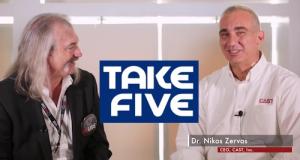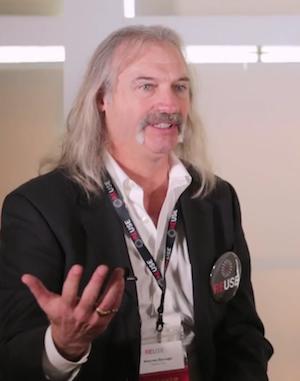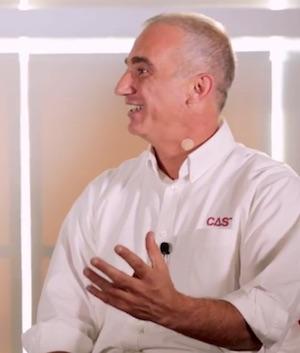Take Five with Warren, S.8, Ep.2: Nikos Zervas, CAST Inc.
Warren Savage: Hello everyone and welcome to another edition of take five with Warren and I'm joining you today live from the REUSE Conference in Mountain View California. I’m very pleased to have with us a previous Take Five guest, Nikos Zervas, from CAST.
Dr. Nikos Zervas: Nice to be here Warren; it's a pleasure like always and I hope this one would not be worse than the previous one!
S: Well I think so far everything’s been pretty good. So what’s your impression of the event here so far?
N: It has been a success. I believe you’ll agree with me: it exceeded my expectations, and I think, both from the exhibitors point of view but also from the visitors point of view. I think it's a pretty good—great—show. We were chatting before and I told you about a customer that stopped by our booth and asked us about some product of ours, and then went to the over to the next booth and asked our competitor about it, and this is what trade shows are supposed to be. It is focused, it provides the opportunity for visitors to sort of talk with different IP vendors: it is great.
S: There are 30-plus companies here, small, medium, and large companies here, and you can really feel a diversity. I think—and we've talked about this a lot —the IP industry is so diverse, with companies from all over the world. You're from Greece, and you know we see companies from 11 different countries represented here and I think it just shows it’s the global engineering population feeding the IP industry, and I mean I’m sure you’ll agree.
Z: I do agree, and that's yet another proof that the IP market is not like EDA, that will eventually be consolidated and controlled by two or three companies.
S: My feeling on that is it just pushes, it just changes so frequently that the customers are always pushing you to new technology and the standards are coming out faster and faster, and the smaller companies tend to be more agile as far as being able to react to what the customers are asking for.
Z: That's part of it. Standards evolve as you said, and customer requirements for the same piece of IP evolve as well. And as you said, smaller companies are always faster, but also more supportive of their customers. And, you know, there's another dimension here, behind why our customers need more providers, and there’s actually a specific need for them: they do not want to depend on the same three or four companies for both their EDA tools and their IP. We hear this from customers: if we end up there, these guys are going to own our business. I mean, they have a strategic interest in supporting us, and in smaller vendors being successful.
W: That's right. I think the other thing is, I think another reason for the diversity of the IP community, is if everyone has the same IP in their chips, then there's less differentiation, right? So you have some technology that nobody else has, so [customers] choose your company because they know that the CAST technology is different than they can get from somebody else.
Z: Yes, that’s right. I mean, it's really hard to differentiate your design if you're using the same building blocks as everyone else.
S: Sure, sometimes it doesn't matter: USB has to talk to USB. But there are also graphics cores and video cores, and those all have some secrets.
Z: And then you know some IP perform better under specific conditions, some other IP perform better under different conditions. You’ve got lower-power design, higher-performance design; you’ve got all kinds of variations in requirements, which a single piece of IP just cannot fulfill.
S: Exactly, and what's your impression of the new markets that are coming in semiconductor IP? Everyone's talked about IoT, and automotive we saw this morning is growing like crazy, new types of applications: it seems to me that those things are driving a diversity of IP companies [for example] there are new people we’re seeing here today that I'd never heard of before.
Z: Well, we've been witnessing this activity and it has been great. I do not know whether they are actually fueled by IoT because I do not know exactly what IoT is anymore. But in any event, there's activity; automotive as you said is going crazy, and we have seen IP companies that have disappeared and now they are here. Amphion was acquired twelve years ago and then after acquisition and acquisition they spun out again in and they’re an IP vendor again! I was really happy to see them here. So, yeah, there's activity, I mean we have started seeing new startups, and that’s something that had gone away for a long time.
S: Well I’ve said this for many years, I mean 10-15 years ago, when you had some smart engineers at a semiconductor company they would spin out, and they would start another semiconductor company. That's not happening anymore; now those guys are starting IP companies. So that intelligence, that brain trust, is moving into IP, and that is the modern way to get these great ideas into silicon.
Z: I mean those smaller companies, IP companies that pop up, they have their own challenges to face. From the customer perspective they always represent risk, both on the business side but also on the technical side: do they have the quality of the product and all that. So this is where many smaller IP companies struggle or fail, and this is where CAST’s business model comes to play, helping customers—bringing value to our customers—but also to smaller IP vendors. Because what we do is we scan the market, we identify IP, we audit it, we make sure it satisfies standards, then the customer has to legally deal with us, with CAST. So the risk is mitigated in many in many ways, and that’s important.
S: You're providing value on both sides.
Z: Yes, that's what we have been trying to do, and it has been proven [to be] a successful model, I mean, we are doing that [for over 20 years].
S: How old is CAST?
Z: 23 years.
S: So one of one of the oldest IP companies in the world.
Z: Right, what we say is we were doing like before the term “IP core” was invented, right because that came up around 1999, and CAST was founded in 1993.
S: Exactly. So you guys are at the leading edge, and it's a pleasure to have you on Take Five again, and echoes and thanks for being here, and thanks for being at the show, and we'll see you guys next time on Take Five with Warren.




